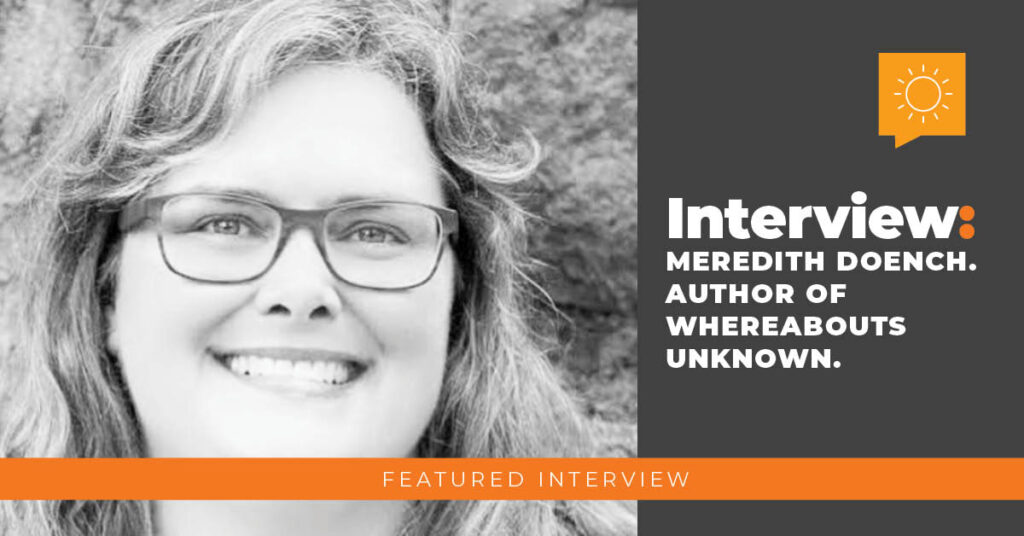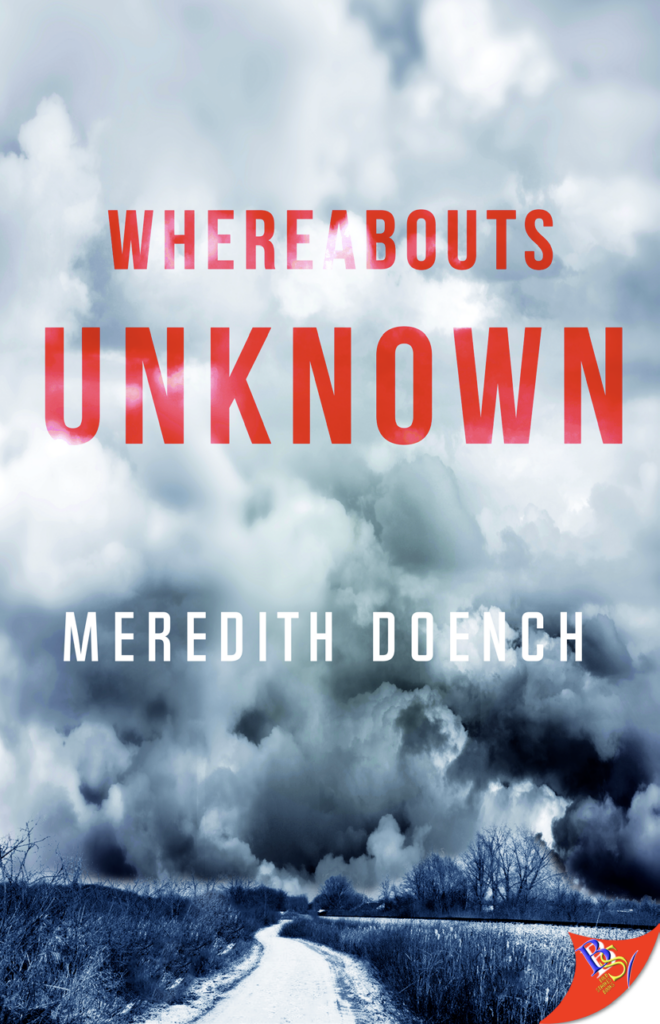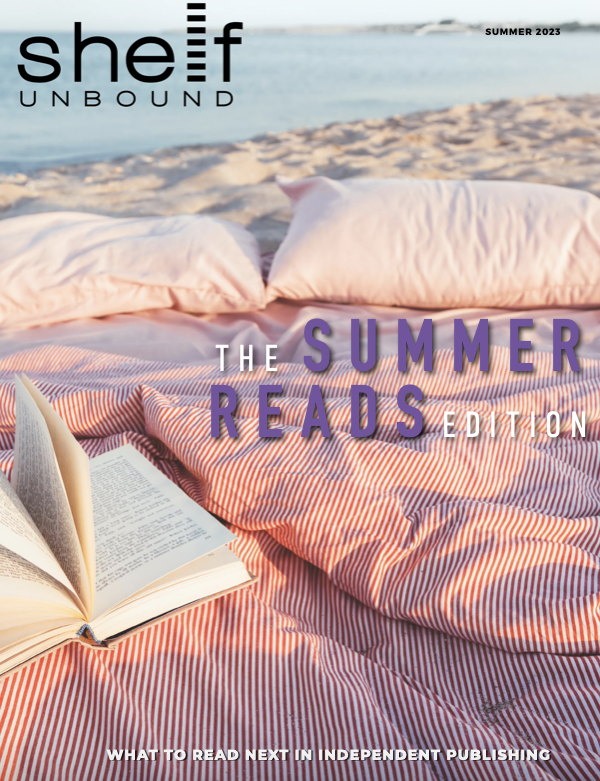
BY CHRISTINA CONSOLINON
Crime writer Meredith Doench is an award-winning author of four novels: The Luce Hansen series, which includes Crossed, Forsaken Trust, and Deadeye, and the stand alone novel, Whereabouts Unknown. Doench’s work has been lauded for exploring the human psyche, providing psychological twists, and balancing character and plot. Here, she reveals how horror influenced her writing, why she’s fascinated with justice, how the community can help queer books and writers, and what literary citizenship means to her.

Whereabouts Unknown
Theodora Madsen has everything she’s ever hoped for: a distinguished career as a homicide detective with the Dayton Police Department, a woman she loves, and a baby on the way.
While Theo and Bree nest and plan for their family’s future, two sixteen-year-old Ohio girls vanish—one from Dayton and the other from Brecksville—each leaving behind a bloody handprint. Then a routine interview goes disastrously wrong, and Theo’s injured and facing a lengthy recovery.
With her professional future uncertain and the cases growing cold, Theo scrambles to piece together the links between the girls. But the clock is ticking and time is running out.
INTERVIEW…
With a background in special education and English/creative writing, you’re currently an instructor at University of Dayton. Did you always want to be a teacher? Does your classroom experience inform your writing?
MD: I caught the teaching bug early, for sure. My mom was a fourth-grade teacher for many years, and she strongly encouraged me to go into teaching. I taught high school students in a special needs classroom for three years. I wasn’t writing thrillers at that point in my life, but I was writing short stories and essays. I wasn’t satisfied with my teaching job for many reasons, but mostly because I wanted to do something with writing. A good friend encouraged me to go back to school for my master’s degree and explore the writing field. Once I found creative writing classes/programs at the graduate level, I was hooked. However, I wasn’t ready to let teaching go. I taught as a graduate student and then decided to teach at the college level. I’m going on my twelfth year as a lecturer of creative writing, literature, and composition at the University of Dayton.
I have learned through my teaching that there is still so much I need to learn about writing. One of the reasons I love creative writing is because there are countless ways to do it “right.” I am fascinated by the multitudes of ways to combine language and the different points of view my students bring to their writing. I work hard to create an environment in my classes where we all learn from one another.
There is always room for improvement in my own writing. One of the best ways for me to grow as a writer is to engage in discussions about craft with others. I love to go to writing conferences and workshops for this very reason, and I always leave with a few new ideas of how to approach my own writing projects. There is so much reciprocity in the classroom workshop environment and fluctuations of roles between teacher and student—I love that! I cannot imagine my writing life without the involvement of teaching.
Your novels are listed as crime thrillers, but you’ve stated you wanted to be a horror writer since the eighth grade, and that Luce Hansen, the main character in your eponymous series, is “built on the horror genre.” There’s sort of a fine line between crime thrillers and horror, no? Have you considered writing horror?
MD: Absolutely! In fact, I set out to be a horror writer and it wasn’t until graduate school that I found my love of crime fiction and thrillers. I realized what drew me to horror was some of the beloved tropes of the genre like the final girl, twist endings, and the outsider who finally gets some glory. Somewhere along the path, I realized my stories were really about issues of justice and how that looks for different people. I started to play around with characters who solved crimes for a living. The more crime stories I wrote, everything clicked into place. My writing still has some very dark and grisly elements to it. And I bet I’ll never get over my love of reading and watching horror. My writing these past ten years, though, has really fallen on the side of the crime thriller.
Thanks for bringing up the topic of justice! In a lovely interview with author Erin Flanagan, you mentioned that what you really want to write about is “who gets [justice], how it’s metered out, and why.” Can you tell us a little more about why that might be the case?
MD: Yes, this is my fascination with justice. I spend a lot of time thinking about how it works and doesn’t work in our society. There seems to be a system that meters out justice in a manner that’s meant to quiet the outrage of society. I see it as a type of band-aid, an attempt to halt some of the pain in the moment. But the true meaning behind justice is for those who hurt to find peace. I’m not sure our system is set up to take on an idea as big as peace.
Along with writing crime fiction, I also teach an American Prison Literature and Culture class where we try to hash out why certain people have gotten the sentences they have and why others who have committed similar crimes have not. So much of this has to do with race and class in our culture. So many people in our culture are overlooked by falling into the category of “the other.” One of my favorite parts of writing fictionalized crime is the allowance it gives for a glimpse into the multiple ways justice is delivered whether that be in a court room, within community, or through karmic means.
The Midwest is your setting of choice at the moment. What about the Midwest makes it a great place to set stories? Do you find any challenges with setting the books there?
MD: I really love writing about the areas where I live. My latest novel, Whereabouts Unknown, was set in Dayton, my hometown and current residence. There’s something about the familiarity of it, these locations where I’ve spent so much time at various stages of my life. Dayton is its own comeback story, or at least one in the making, and that atmosphere really gives me a lot to work with in my writing. I also love that sneaking suspicion I sometimes get when I’m out and about that I might just run into one of my characters!
My thriller series that featured Ohio Bureau of Criminal Investigation agent Luce Hansen were all set in made-up towns in Southeast Ohio. I’ve long been fascinated with that area of Ohio, nestled along the edge of the Appalachian Mountains. With its rolling hills and thick forest, it’s the perfect Americana backdrop for a crime novel. There are so many places like this in the Midwest where the inherent wild beauty runs deep. However, what you see isn’t always what you get. I love to play with those mysteries of the land, the people, and the history of the area. These are where secrets live. There’s a ruggedness to the Midwest that really suits my sense of story and characters.
I love your characters! They are strong, independent women who often give voice to the underdog. Theodora Madsen, from Whereabouts Unknown, is especially relatable and real. Who inspires these characters? And how do you make sure they all have distinct voices?
MD: Thank you! It took a long time for me to fully hear Theo’s voice, but once she came through, it was like I’d known her my whole life. It really happened that way for my protagonist from the Luce Hansen series as well. Honestly, the major inspiration for these characters comes from my own frustration in finding books to read as a teen and young adult about lesbians or women struggling with their sexuality. I was looking for these representations of LGBTQIA in books and couldn’t find them. The sad thing is there were people writing these novels and stories! Granted, I should have asked a librarian for help, but the stigma of LGBTQIA, particularly for teens, kept me (and countless others) feeling isolated and alone. I’ve always loved the quote from Beverly Cleary: If you don’t see the book you want on the shelves, write it. Well, that’s basically what I did and continue to do. I never want another teen/young adult to struggle in finding representations of themselves in literature.
Let’s dig a little deeper into these characters. In addition to lesbian protagonists, you also showcase characters on the disability spectrum. Did you set out to write these characters specifically, or did they arise organically? How do you determine which characteristics will suit the story best?
MD: I want to say these characters are organic and grow out of my writing, however, many of my leading characters struggle with many of the same issues I have. I have always turned to writing to work through personal struggles and was an avid journaler through high school and college. In the last ten years or so, my journaling has laxed, and the work on my novels is where a lot of the characters show up. For example, Annabelle in Whereabouts Unknown is a sixteen-year-old who was diagnosed with lupus as a child. In the novel, she struggles with the autoimmune disease and is without her medication for some time, and much of Annabelle’s narrative is about her inability to control her body. A few years before I started that novel, I was diagnosed with my own autoimmune disease and was in the throes of dealing with my own symptoms and frustrations regarding medications and my body’s response to them. So much of my own journey went into Annabelle’s story.
So many of my characters have fallen somewhere on the disability spectrum in one way or another. I often consider how my degree in Special Education has influenced that. One of the greatest things I learned from my studies in Special Education is the resilience of people. There’s nothing like the sheer determination to succeed despite personal limitations. The best gift my degree gave me was the tool to meet people exactly where they are, not where they hope to be or where I would like them to be—exactly as they are. These skills have helped me so much in my writing and the building of strong, believable characters. It has helped me to see that what others consider to be a character’s flaw or hardship can become a character’s greatest strength. It’s also helped me to have more compassion and patience, not just with my characters, but with the people and animals in my life.
The publishing industry has made headway in terms of diversity and representation across the board, thanks in part to work like yours. It’s paramount for readers and the community at large to support an author’s work, so how can we help make even greater strides in the publishing industry?
MD: It’s a really difficult time right now for LGBTQIA people and books. We need these voices and stories now more than ever. There are those who are actively trying to silence our voices and erase our experience from existence. There have also been considerable attempts to “erase” trans people in our country through health care and legislation. The banned books effort this year was stronger than it’s ever been and fueled by Florida’s Don’t Say Gay ruling. With so much going against the LGBTQIA community, our voices are still rising. I applaud the smaller presses who have been steadfast in their support through publishing queer books. We have seen larger presses in the last few years stepping up as well.
One change that would help queer books and writers is working against the notion that we are somehow separate or different from other writers/books in our genres. Many times, LGBTQIA books in stores are kept in their own section, usually in some far corner. Additionally, at many conferences and book events, LGBTQIA writers are designated to a panel all our own. This type of separation sends the message our work is somehow different and only to be displayed for the Pride month of June. Integration of our work with other categories and writers could help to fade these lines of separation.
Writing doesn’t happen in a vacuum, and establishing community and embracing literary citizenship is important. What does “literary citizenship” mean to you, and how do you balance literary citizenship with making the time for you and your own work?
MD: Literary citizenship is extremely important to me, as I believe writers do not write alone. No matter how much we love the image of the lone writer blazing away into the wee hours of the morning on a manuscript, we’re always bouncing ideas off one another, whether that is through simply reading another writer’s book or having conversations about characters and plot development. In other words, literary citizenship means community to me. One of the most important ways I engage with literary citizenship is in the classroom. I try to introduce my students to new writers and genres as well as through the suggestions of readings that might enhance their own writing. I’ve found that most of my students have never attended a live book event or a writing workshop. This breaks my heart because I love the level of engagement and excitement at these events, and I want my students to experience them too. I’m usually emailing students with opportunities, live or online, and encouraging them to dip into the writing community a little further. Outside of the classroom, I do my best to support authors whose work I really love and have served on the board of Mystery Writers of America Midwest Chapter for nearly four years. I’ve also been involved with the development of the Queer Crime Writers organization. This work can be hard to balance with my own writing, but I’ve always found it well worth my time. I have so much to learn about writing and publishing, and I’ve found my engagement with other authors has helped me to feel like we are in this together rather than alone.
What’s next for you?
MD: I’ve been writing some creative nonfiction about a true crime case in Ohio as well as working with a few new characters that I hope will make their way into a novel or two soon. Whereabouts Unknown released in March 2022, and I’ve really been taking my time to determine what I want to write next. It’s important to me that whatever comes next feels right and not rushed. It can be hard to trust the process and be patient, but I’ve found it’s worth it in the end.

Continue Reading…
Article originally Published in the June / July / August 2023 Issue: Summer Reads.
